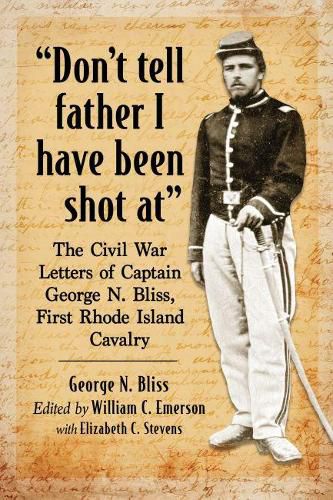Readings Newsletter
Become a Readings Member to make your shopping experience even easier.
Sign in or sign up for free!
You’re not far away from qualifying for FREE standard shipping within Australia
You’ve qualified for FREE standard shipping within Australia
The cart is loading…






This title is printed to order. This book may have been self-published. If so, we cannot guarantee the quality of the content. In the main most books will have gone through the editing process however some may not. We therefore suggest that you be aware of this before ordering this book. If in doubt check either the author or publisher’s details as we are unable to accept any returns unless they are faulty. Please contact us if you have any questions.
Captain George N. Bliss experienced almost every aspect of the Civil War, except death. As an officer in the First Rhode Island Cavalry, Bliss engaged in some twenty-seven actions. He miraculously survived a skirmish in Waynesboro, Virginia, in September 1864, when he single-handedly charged into the Black Horse Cavalry. Badly injured and taken prisoner, Bliss was consigned to the notorious Libby Prison in Richmond. Midway through the war, Bliss also served for nine months at a Conscript Camp in Connecticut, where he sat on several courts-martial.
Bliss richly detailed his war experiences in letters to his close friend, David Gerald, who lived in Rhode Island. In absolute candor, Bliss expressed his opinions on many topics and related a plethora of firsthand details. A colorful writer, he also penned dispatches from the field for a Providence newspaper. Meticulously transcribed and annotated, this collection of letters is unusual because Bliss did not mask the devastation and challenges of his intense wartime experiences as he might have done in writing to a family member. In conclusion, the editors describe how, following the war, Bliss sought out the Confederates who almost killed him, forming personal relationships that lasted for decades.
$9.00 standard shipping within Australia
FREE standard shipping within Australia for orders over $100.00
Express & International shipping calculated at checkout
This title is printed to order. This book may have been self-published. If so, we cannot guarantee the quality of the content. In the main most books will have gone through the editing process however some may not. We therefore suggest that you be aware of this before ordering this book. If in doubt check either the author or publisher’s details as we are unable to accept any returns unless they are faulty. Please contact us if you have any questions.
Captain George N. Bliss experienced almost every aspect of the Civil War, except death. As an officer in the First Rhode Island Cavalry, Bliss engaged in some twenty-seven actions. He miraculously survived a skirmish in Waynesboro, Virginia, in September 1864, when he single-handedly charged into the Black Horse Cavalry. Badly injured and taken prisoner, Bliss was consigned to the notorious Libby Prison in Richmond. Midway through the war, Bliss also served for nine months at a Conscript Camp in Connecticut, where he sat on several courts-martial.
Bliss richly detailed his war experiences in letters to his close friend, David Gerald, who lived in Rhode Island. In absolute candor, Bliss expressed his opinions on many topics and related a plethora of firsthand details. A colorful writer, he also penned dispatches from the field for a Providence newspaper. Meticulously transcribed and annotated, this collection of letters is unusual because Bliss did not mask the devastation and challenges of his intense wartime experiences as he might have done in writing to a family member. In conclusion, the editors describe how, following the war, Bliss sought out the Confederates who almost killed him, forming personal relationships that lasted for decades.